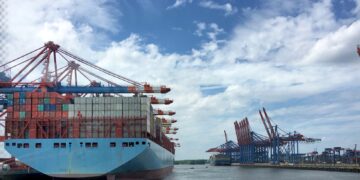In a recent earnings call, Maersk CEO Vincent Clerc unveiled plans for significant job reductions within the company, citing the worsening conditions in the ocean market as the primary driver behind the decision. Maersk, one of the world’s largest shipping companies, has already implemented substantial workforce reductions in 2023, reducing its employee count from 110,000 to 103,500 by the end of the third quarter. However, the volatile and unpredictable nature of the ocean market has prompted Maersk to target an additional 10,000 job cuts.
The company’s cost-saving efforts, which include workforce reductions and other measures, are expected to result in approximately $600 million in savings in selling, general, and administrative expenses by 2024. Maersk’s decision to scale down its workforce reflects the challenges it faces due to the fluctuating conditions in the ocean market.
One significant factor contributing to the company’s woes is its decision, in conjunction with Mediterranean Shipping Company (MSC), not to proceed with the 2M alliance. Additionally, the ocean carrier is grappling with global demand volatility, further exacerbating its challenges in navigating the market.
Vincent Clerc expressed his concerns about the situation, stating, “Throughout the quarter, we have seen overcapacity across most regions triggering a new wave of price reductions.” Despite a 5% year-over-year increase in volumes for Maersk’s ocean segment, its revenue plummeted by a staggering 56% year-over-year, dropping from $18 billion in the third quarter of 2022 to $7.9 billion in the third quarter of 2023.
This significant decline in revenue aligns with the broader trend of ocean freight rates, which have seen a sharp decrease from their pandemic-induced highs. According to Freightos’s Global Container Freight Index, spot rates in October 2023 were at $1,166, compared to over $3,000 a year earlier for moving a 40-foot container.
It’s not just the ocean segment that is feeling the impact; other segments within Maersk, including logistics & services, terminals, towage, and maritime services revenue, have also experienced declines when compared year-over-year.
Looking ahead, Vincent Clerc offered a bleak outlook, stating that clear waters were not on the horizon for Maersk. Instead, he anticipates “further headwinds as the market conditions in the ocean sector continue to deteriorate.” As the company grapples with these challenges, it remains to be seen how Maersk will adapt to a rapidly changing industry landscape.
Stay informed on supply chain news at The Supply Chain Report. Free international trade tools are at ADAMftd.com.
#MaerskJobCuts #ShippingIndustryChallenges #OceanMarketDownturn #VincentClerc #WorkforceReductions #MaerskEarnings #MSCPartnership #FreightRateDecline #GlobalShipping #SupplyChainDisruptions #LogisticsIndustry #ContainerFreight #OceanFreightChallenges #ShippingRevenueDrop #CostSavingMeasures #JobReductionsInShipping















